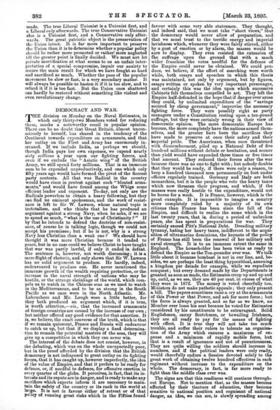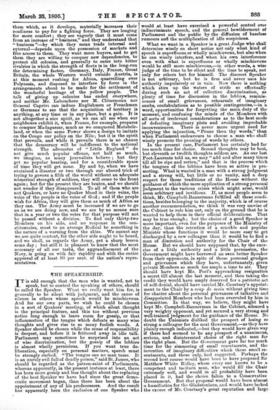DEMOCRACY AND WAR. T HE division on Monday on the Naval
Estimates, in which only thirty-two Members voted for reducing them, marks a noteworthy recoil in popular opinion. There can be no doubt that Great Britain, almost uncon- sciously to herself, has shared in the tendency of the Continent towards expenditure on armaments, and that her outlay on the Fleet and Army has enormously in- creased. If we include India, as perhaps we should, though India pays her own expenses, we expend nearly sixty millions a year upon our fighting forces, and even if we exclude the "Asiatic wing" of the British Army, we still spend forty millions. That is an immense sum to be expended unproductively, and one which only fifty years ago would have formed the pivot of the fiercest party contests. All that was Radical in the country would have risen in protest against such "bloated arma- ments," and would have found among the Whigs some efficient leader and exponent. To-day, not only are the Radicals powerless to obtain a heavy following, but they can find no eminent spokesman, and the work of resist- ance is left to Sir W. Lawson, whose natural topic is teetotalism, and who thinks that he has produced an argument against a strong Navy, when he asks, if we are to spend so much, "what is the use of Christianity ?" If by that he intends to defend the doctrine of non-resist- ance, of course he is talking logic, though we could not accept his premisses ; but if he is not, why is a strong Navy less Christian than a weak one ? We should have thought it was more Christian because it tended to peace, but in no case could we believe Christ to have taught that war was partly lawful, if only it ended in defeat. The sentence is, however, not worth discussing ; it is a mere flight of rhetoric, and. only shows that Sir W. Lawson has no solid argument to produce. He hardly, indeed, endeavoured to produce one. He never mentioned the immense growth of the wealth requiring protection, or the increase in the naval strength of nations who may be hostile, or the strange shrinkage of the world, which com- pels us to watch in the Chinese seas as we used to watch in the Mediterranean, and to be as strong in the South Pacific as we once were in the North Atlantic. Mr. Labouchere and Mr. Lough were a little better, for they both produced an argument which, if it is true, is worth attention,—viz, that the increased armaments of foreign countries are caused by the increase of our own ; but neither offered any good evidence for that assertion. It is, we believe, the exact converse of the truth, which is that if we remain quiescent, France and Russia will endeavour to catch us up, but that if we display a fixed determina- tion to remain the potential masters of the seas, they will give up a competition in which they can never win.
The interest of the debate does not consist, however, in the debating, which was on the whole unexpectedly poor, but in the proof afforded by the division that the British democracy is not indisposed to great outlay on its fighting forces, that it has caught up, however imperfectly, the idea of the value of Empire, and that it prefers to be ready for defence, or, if needful to defence, for offensive exertion in every quarter of the globe. It perceives, in fact, that its in- terests and its repute are in danger, and is ready to make any sacrifices which experts inform it are necessary to main- tain the safety of the country or its rank in the world at large. it is not in favour either of retreat or of that poacy of running great risks which in the Fifties found favour with some very able statesmen. They thought, and indeed said, that we must take "short views," that the democracy would never allow of preparation, and that we must trust to the terrific energy and imperial lavishness which, whenever they were fairly stirred, either by a gust of emotion or by alarm, the masses would be sure to display. They even resisted the extension of the suffrage upon the ground that with a much wider franchise the votes needful for the defence of the Empire could never be obtained. We could pro- duce, we believe, if the effort of searching were worth while, both essays and speeches in which this thesis was maintained, not only by argument, but by figures, essays written or spoken by very important personages, and certainly this was the idea upon which successive Cabinets felt themselves compelled to act. They left the Empire half-defended in the hope that if danger ever arose they could, by unlimited expenditure of the "savings secured by cheap government," improvise the necessary fighting force. They were possibly right as party managers under a Constitution resting upon a ten-pound suffrage, but they were certainly wrong in their view of democratic opinion. The more democratic Europe has become, the more completely have the nations armed them- selves, and the greater have been the sacrifices they have made to preserve at once their safety and their imperial pride. The Americans, when once threatened with dismemberment, piled up a National Debt of five hundred millions without debate or hesitation, and sooner than yield would have expended three times or five times that amount. They reduced their forces after the war because there was no one to fight with ; but nobody doubts that they would be ready, if there were only a reason, to keep a hundred thousand men permanently on foot under officers regularly trained. Germany and Italy are both monarchies, but it is the people who vote the heavy taxes which now threaten their progress, and which, if the masses were really hostile to the expenditure, would not be borne for a week. It is France, however, which is the great example. It is impossible to imagine a country more completely ruled by a majority of its own citizens than France has been since the fall of the Empire, and difficult to realise the sums which in the last twenty years, that is, during a period of unbroken peace, she has spent in preparations for war. They certainly exceed Pitt's National Debt. Dreading military tyranny, hating her heavy taxes, indifferent to the acqui- sition of ultramarine dominions, the keynote of the policy of France has still been the renewal of her military and naval strength. It is to an immense extent the same in England. The householder has been twice as ready to defend the Empire as the Ten-pounder ever was. We talk little about it because bombast is not in our line, and, be- sides, we are perhaps the least thing hypocritical, annexing a kingdom per decade for example, while we repudiate conquest ; but every demand made by the Departments is granted as soon as made, the Estimates creep up and up and up, until, as we see, they are 40 per cent. in excess of what they were in 1872. The money is voted cheerfully too. Ministers do not make pathetic appeals ; they only present a bill. The papers sometimes raise a cry at the armaments of this Power or that Power, and ask for more force ; but the force is always granted, and so far as we know, no Member ever loses his seat because he voted for Estimates considered by his constituents to be extravagant. Solid Englishmen, canny Scotchmen, or bewailing Irishmen, they are all ready to pay for the means of fighting with effect. It is true they will not take too much trouble, and suffer their rulers to tolerate an organisa- tion of the Army which ensures a maximum of ex- pense and a minimum of rapidly mobile force, but that is a result of ignorance and not of penuriousness. They are quite willing the soldiers should increase in numbers, and if the political leaders were only ready, would cheerfully endure a Session devoted solely to the great work of obtaining twelve hundred effectives in each regiment without increase to the expenditure on the whole. The democracy, in fact, is far more ready to fight than the middle class ever was.
The signs are that this readiness will continue through- out Europe. Not to mention that, as the masses become affected by their tincture of education, they become sensitive to national position and cognisant of national danger, an idea, we can see, is slowly spreading among them which, as it develops, materially increases their readiness to pay for a fighting force. They are longing for more comfort ; they see vaguely that it must come from an increase of "business," and they understand that "business "—by which they mean trade internal and external—depends upon the possession of markets and free access to them. They want more buyers, and to get them they are willing to conquer new dependencies, to protect old colonies, and generally to enter into bitter rivalries in which the strength of fleets is in the long-run the determining factor. Germany, Italy, France, Great Britain, the whole Western world outside Austria, is at this moment rushing for Africa, quarrelling over Polynesia, and disposed to interfere by force in the arrangements about to be made for the settlement of the wonderful heritage of the yellow people. The talk of giving up colonies has ended everywhere, and neither Mr. Labouchere nor M. Clemenceau nor General Caprivi can induce Englishmen or Frenchmen or Germans to see that the acquisition of territory is anything, at any time or in any place, but a gain. It is not altogether a nice spirit, as we can all see when our neighbours exhibit it, when France, for example, prepares to conquer Madagascar, much as we conquered Matabele- land, or when the same Power shows a design to imitate on the Congo our policy on the Nile ; but it is the spirit that prevails, and while it prevails there is no chance that the democracy will be indifferent to the national strength. The advocates of "Little England" do not give much popular offence, not half so much, we imagine, as many journalists believe ; but they get no popular hearing, and for a considerable space of time they will get none. By and by, when we have sustained a disaster or two through our absurd trick of trying to govern a fifth of the world without an adequate numerical strength of soldiers, they will come to the front again ; but for the present they are beaten, and we should not wonder if they disappeared. To all of them who are not Quakers, or have no Quaker blood in their veins, the voice of the people is the voice of God ; and if the people wish for Africa, they will give them as much of Africa as they can. The Army must be increased if we are to go on as we are doing now, and we are by no means sure that in a year or two the votes for that purpose will not be passed without a division. To find only thirty-two Members on his side, and no response in the con- stituencies, must to an average Radical be something in the nature of a warning from the skies. We cannot say we are quite content, for the other side ought to be heard, and we shall, as regards the Army, get a sharp lesson some day ; but still it is pleasant to know that the most necessary of all our tasks, the aggrandisement of the Navy, is going on with fair rapidity and with the entire approval of at least 90 per cent. of the nation's repre- sentatives.







































 Previous page
Previous page